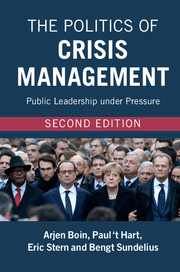Book contents
- Frontmatter
- Contents
- List of Figures
- List of Tables
- Introduction to the Second Edition
- 1 Managing Crises: Five Strategic Leadership Tasks
- 2 Sense Making: Grasping Crises as They Unfold
- 3 Decision Making and Coordinating: Shaping the Crisis Response
- 4 Meaning Making: Constructing a Crisis Narrative
- 5 Ending a Crisis: Managing Accountability
- 6 Learning and Changing: From Crisis to Reform
- 7 How to Deal with Crisis: Lessons for Prudent Leadership
- References
- Index
Introduction to the Second Edition
Published online by Cambridge University Press: 15 December 2016
- Frontmatter
- Contents
- List of Figures
- List of Tables
- Introduction to the Second Edition
- 1 Managing Crises: Five Strategic Leadership Tasks
- 2 Sense Making: Grasping Crises as They Unfold
- 3 Decision Making and Coordinating: Shaping the Crisis Response
- 4 Meaning Making: Constructing a Crisis Narrative
- 5 Ending a Crisis: Managing Accountability
- 6 Learning and Changing: From Crisis to Reform
- 7 How to Deal with Crisis: Lessons for Prudent Leadership
- References
- Index
Summary
The original edition of this book was published in late 2005. Ten years on, the salience of its topic is undiminished. In the past decade, the world has seen many natural catastrophes, industrial accidents, high-profile acts of terrorism, crowd tragedies, cyber scares, infrastructure breakdowns, mass shootings, migration flows, and humanitarian emergencies. There is a growing awareness that in an increasingly interconnected world, crises do not stop at borders and can span entire regions or even assume a global scale.
Public expectations of governments and their leaders in times of crisis remain high. Public leaders are expected to be prepared for a wide variety of contingencies; they must “ramp up” their performance when a crisis emerges. At the same time, it is becoming increasingly clear that the tasks of crisis leadership require more than organizing an effective response. Leaders must build and support transboundary collaboration and transnational institutions that can effectively deal with the borderless nature of contemporary crises.
Much has happened over the past decade in the world of crisis management. It is fair to say that crisis management has become a profession, an industry, and a growing community of practice and research. In many governments and corporations, there are now more dedicated roles, high-level bodies, training and exercise programs, conferences, and high-tech command and communication facilities than there were a decade ago. A cross-disciplinary array of researchers, consultants, software developers, and manufacturers push the trends toward professionalization, propelled by ever-growing demand from both the corporate and the public sectors. This is perhaps what one might expect in the risk societies that the advanced nations have become. Citizens, markets, media, and politicians expect that risk is minimized, threats are mitigated, and crises are effectively combated. Leaders who fail to take this seriously will lose credibility, support or even their job when caught by a crisis.
The response to the first edition of the book neatly dovetails this trend. It has struck a chord, both with students and practitioners. As authors of the book, we were fortunate enough to receive invitations to speak to, train, exercise, and evaluate crisis managers from a wide range of countries and sectors. Even today, the book continues to be widely used in courses worldwide and in several languages. The feedback we have received during the many encounters with practitioners, students, and colleagues has been inspiring.
- Type
- Chapter
- Information
- The Politics of Crisis ManagementPublic Leadership under Pressure, pp. 1 - 2Publisher: Cambridge University PressPrint publication year: 2016



